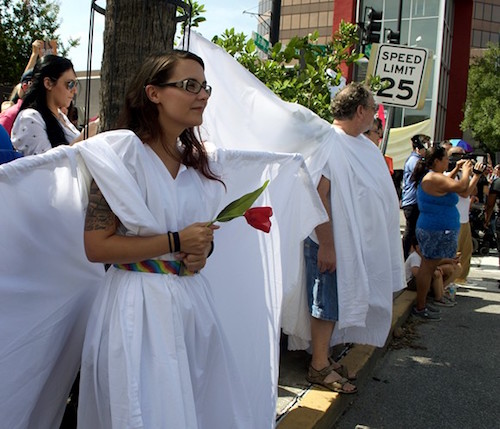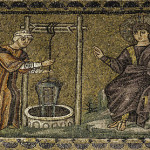We run our website the way we wished the whole internet worked: we provide high quality original content with no ads. We are funded solely by your direct support. Please consider supporting this project.

No Room for Judgment
In the light of the horrible violence in Orlando, and in response to the sickening judgmental statements that some Christian leaders have been making since the mass shooting about the victims who belong to the LGBTQ community, this is a time to remember our calling to revolt against all judgment as kingdom people. In the image above “Hundreds of demonstrators sang “Amazing Grace” to drown out the Westboro members’ infamous chants and cries as ‘guardian angels’ helped form a wall protecting the Cathedral Church of St. Luke with their large white wings.”* These “guardian angels” demonstrate beautifully the attitude the church should take towards oppressed groups.
The following is adapted from The Myth of A Christian Religion which challenges the notion that it is appropriate to cast judgment upon this or any other community.
Judgment is a big deal, even though we don’t think of it as such because it is so prevalent in society and even in the church. But it is a form of idolatry. Actually, it’s the most fundamental form of idolatry there is. It is a way of separating ourselves from other people and placing ourselves (or “our” group) above them. We’re contrasting ourselves favorably with others as a way of making ourselves feel more worthy by comparison.
Jesus makes it clear that judgment and life in the kingdom are antithetical to one another. It’s impossible for me to ascribe unsurpassable worth to a person or a group of people while judging them.
Every judgment we have toward others undermines the thing that we as the people of God are to offer them. Instead of agreeing with God that every person has unsurpassable worth, when we judge others we are disagreeing with him and detracting worth from others.
Jesus came to free us from judgment and to restore our capacity to love the way God loves. He says, “Do not judge, or you too will be judged. For in the same way you judge others, you will be judged, and with the measure you use, it will be measured to you” (Matt 7:2).
Jesus is teaching us that we can either play the judgment game or the grace game. If you don’t want to be judged, he says, don’t judge others. Extend to them the same gracious love that God has extended to you. But if you insist on playing the judgment game, then know that the judgment you give is the judgment you’ll get.
This teaching becomes even more radical when Jesus goes on to say, “Why do you look at the speck of sawdust in someone else’s eye and pay no attention to the plant in your own eye? How can you say, ‘Let me take the speck out of your eye,’ when all the time there is a plank in your own eye” (Matthew 7:3-4).
Jesus wasn’t saying this to people who were living in horrible sin. In fact, by the social and religious standards of the first century, the people Jesus was talking to would have been considered rather holy when compared to most others.
Jesus was challenging their addiction to getting life and self worth from their judgment of others. When we try to ascribe worth to ourselves at the expense of others—by judging them—we always minimize our own sins and faults and maximize the sins and faults of others.
To put it simply: We feed off the idolatrous illusion that, however imperfect we might be, at least we are not like those people.
Jesus calls us to revolt against this religious attitude. We are to regard our own sins—whatever they might be—as plank-sins while regarding other people’s sins—whatever they might be—as speck-sins. In our own eyes, we are to maximize our sins and faults and minimize the sins and faults of other. Whatever the faults we think we see in another, we’re to regard our sin as worse. With the apostle Paul, we’re to see ourselves as “the worst of sinners” (1 Timothy 1:15-16).
—Adapted from The Myth of Christian Religion, pages 49-54
Photo by Monivette Cordeiro via Orlando Weekly
*Quote from Sunday, June 19th article in Orlando Weekly
Category: General
Tags: Homosexuality, Judgment, LGBTQ, Love
Topics: Following Jesus
Related Reading

The Risk of Love & the Source of Evil
On Sunday Greg tweeted the following: Love IS a tremendous risk. But if humans ever concluded the risk was not worth it, we likely become extinct rather quickly. … Yes, love is risky. It costs us everything, and we sometimes get terribly hurt. But it’s this risk that “makes the world go round.” … And…

Spiritual Warfare: What is it?
The Kingdom is “not of this world,” and neither is its warfare. Jews had always believed that God confronted spiritual opposition in carrying out his will on earth. In the Old Testament, these evil forces were usually depicted as cosmic monsters and hostile waters that threatened the earth. For a variety of reasons this belief…

Believing the Best About Political Opponents
The surprising election of Donald Trump to President of the United Stated has exposed a profound, anger-filled divide running through the center of the American population. I would like to speak to the many Christians who are on the side of the divide that is outraged by his victory. In light of the offensive things Trump…

If You Lack LGBTQ Policies, Does that Mean Anything Goes? (podcast)
Greg looks at confronting issues in a kingdom context. How does relationship impact how we challenge one another? Episode 563 http://traffic.libsyn.com/askgregboyd/Episode_0563.mp3

God is Different Than You Think
The revelation of “[a] God humiliated even unto the cross,” as Pascal put it, flies in the face of what most Jews of Jesus’ time, and of what most people throughout history, have expected God to be. In this light, we can discern the thematic centrality of the cross in Jesus’ many teachings that reverse…

